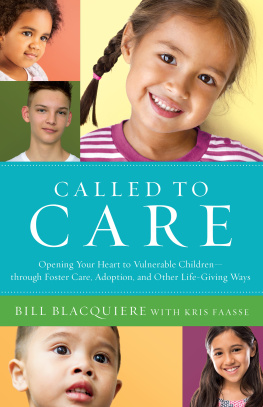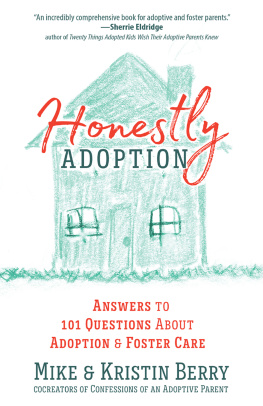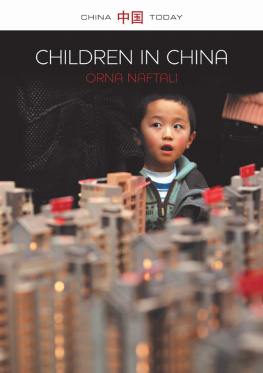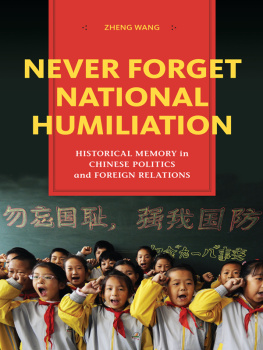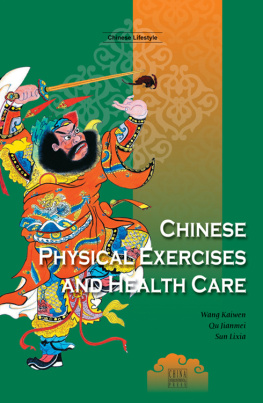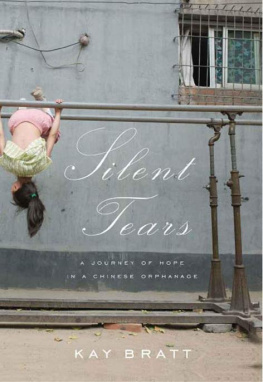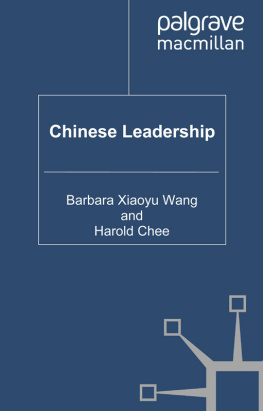Stanford University Press
Stanford, California
2016 by the Board of Trustees of the Leland Stanford Junior University.
All rights reserved.
No part of this book may be reproduced or transmitted in any form or by any means, electronic or mechanical, including photocopying and recording, or in any information storage or retrieval system without the prior written permission of Stanford University Press.
Printed in the United States of America on acid-free, archival-quality paper
Library of Congress Cataloging-in-Publication Data
Names: Wang, Leslie K., author.
Title: Outsourced children : orphanage care and adoption in globalizing China / Leslie K. Wang.
Description: Stanford, California : Stanford University Press, 2016. | Includes bibliographical references and index.
Identifiers: LCCN 2016007827 (print) | LCCN 2016008470 (ebook) | ISBN 9780804799010 (cloth : alk. paper) | ISBN 9781503600119 (pbk. : alk. paper) | ISBN 9781503600126 (ebook) | ISBN 9781503600126 (e-book)
Subjects: LCSH: OrphanagesChina. | OrphansChina. | Abandoned childrenChina. | Intercountry adoptionChina. | Children with disabilitiesInstitutional careChina.
Classification: LCC HV1317 .W36 2016 (print) | LCC HV1317 (ebook) | DDC 362.7340951dc23
LC record available at http://lccn.loc.gov/2016007827
Typeset by Thompson Type in 10/14 Minion
Outsourced Children
Orphanage Care and Adoption in Globalizing China
Leslie K. Wang
Stanford University Press
Stanford, California
To Jin Jin, Huan Cong, Le Qi, and all of the children in China who touched my life. I have been humbled by your extraordinary resilience and courage.
Contents
Acknowledgments
THIS BOOK WOULD NOT EXIST except for the generosity of the organizations, volunteers, families, and children who graciously allowed me into their lives. Over the course of more than a decade their acceptance of me as a researcher, a caregiver, and a friend has been a great source of inspiration.
My interest in the topic of adoption dates back to when I was a study abroad student at Peking University during the late 1990s. There, during a visit to the Forbidden City, I was surprised to see two white American couples with strollers that each held a Chinese baby girl. I pondered for the first time why these children were being abandoned and adopted and how their movement across borders was shaping ChinaU.S. relations. These questions became my constant companions.
Along the way I have been supported by a group of incredible peers. At the University of California Berkeley, Barrie Thorne and Tom Gold served as shining exemplars of mentorship. Thank you for your unfailing support and investment in my research, career, and overall well-being all of these years. Marion Fourcade-Gourinchas, Jennifer Johnson Hanks, and You-Tien Hsing also helped to guide my path. While at Berkeley I benefited from the camaraderie and scholarly feedback of other colleagues, a group that included Zong-shi Chen, Jenny Chio, Julia Chuang, Mark Dallas, Shannon Gleeson, Amy Hanser, Jon Hassid, Jennifer Jones, Charlotte Lee, Elizabeth Logan, Jennifer Randles, Rachel Stern, Chris Sullivan, Chung-Min Tsai, and Suowei Xiao.
In Boston the ideas in this project continued to be shaped by Sofya Aptekar, Kimberly Hoang, Miliann Kang, Jennifer Musto, Jillian Powers, Saher Selod, Nazanin Shahkrokni, and Cinzia Solari. Thanks to Jessica Cobb for her superb editing help. At Stanford University Press, I am indebted to the reviewers, and especially, to Jenny Gavacs for her guidance throughout this process. Lastly, I regret not being able to share this book with Norman Apter, whose historical research on child welfare in China has made a lasting impact on my work. I count myself lucky to have enjoyed his presence as a friend and colleague, although it was for far too short a time.
Financial support for research and writing was made possible by a Fulbright-Hays Research Award and by UC Berkeley, in particular the Department of Sociology, the Graduate Division, the Institute of East Asian Studies, and the Center for Chinese Studies. I also received support from the University of British Columbia, the Association for Asian Studies, and the University of Massachusetts Boston to update and present this research. Over the years I have benefited from the insights of audiences at Princeton University, Harvard University (the Transnational Studies Working Group and the Harvard China Gender Symposium), the University of British Columbia, and the Chinese University of Hong Kong. I presented portions of this work at the annual meetings of the American Sociological Association and the Association for Asian Studies.
Earlier versions of parts of this book have appeared previously in Unequal Logics of Care: Gender, Globalization and Volunteer Work of Expatriate Wives in China, Gender & Society (2013), 27(2): 538560; Importing Western Childhoods into a Chinese State-Run Orphanage, Qualitative Sociology (2010), 33 (2): 137159; and Missing Girls in an Age of High Quality: Government Control Over Population and Daughter Discrimination in Reform-Era China, Social Transformations in Chinese Societies (2009), 4: 245270. Thank you to the publishers for permission to use these materials.
Of course, through it all I could not have ventured along this unpredictable, yet immensely gratifying, journey from California to Vancouver to Michigan to Boston (with many trips to China in between) without the unconditional love and support of my friends and family. This includes Shaana Berman, Marianna Eyzerovich, Diane and Jasson Flick, Karin Iwasaka, Willis Jackson, Iris Ponte, my siblings Elaine and Steve, and my parents Harry and Kim Wang. Im in gratitude to you always.
Introduction
Children and the Politics of Outsourced Intimacy in China
AT THE END OF A FREEZING COLD JANUARY DAY in 2007, I made my first visit to the infant hospice unit at the Haifeng Childrens Welfare Institute (CWI). a Western faith-based organization that provided medical care to abandoned special needs youth. The group had recently opened a large infant hospice, which occupied one full floor of the CWIa model orphanage located in Henan Province, in central China. Tomorrows Children used first-world medical practices to care for the institutions most disabled and ill babies and toddlers until they passed away. Many infants survived and after rehabilitation were returned to the regular state facility, sent out to local foster care, or occasionally even adopted internationally.
I was there to pick up Emma, one of the units young residents. A happy one-year-old girl with a severe bowl haircut, Emma suffered from a rare childhood cancer that had claimed the sight in her left eye. The aggressive disease was threatening her vision in the other eye and possibly even her life. Although it was impossible to know for certain, this illness was most likely the reason she was cast out of her family. As part of my volunteering duties for Tomorrows Children, I was given the task of escorting Emma to Beijing on an overnight train. From there, she would fly to Hong Kong for immediate surgery and chemotherapy.
I soon found myself standing nervously on a dark, crowded train platform holding the girl in my arms. Her urgent medical situation filled me with fear, but Emma had the energy of a healthy, rambunctious toddler. She attempted to squirm out of my grasp as several old men rolled past with rattling metal carts, loudly hawking a diverse array of instant noodles, red cellophane-wrapped sausages, and cheap cigarettes. It was late at night when we boarded the train, settling into the bottom bunk of a dimly lit soft-sleeper car filled with businessmen. Emma bounced up and down on the bed and babbled cheerfully as the men snored noisily overhead. Burdened with an overwhelming sense of responsibility, I lay awake anxiously the entire night, terrified to let her out of my sight. When we reached Beijing the following morning, I passed the girl to an American volunteer waiting at the station and heaved an enormous sigh of relief.


